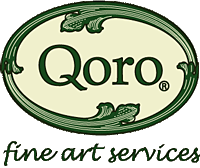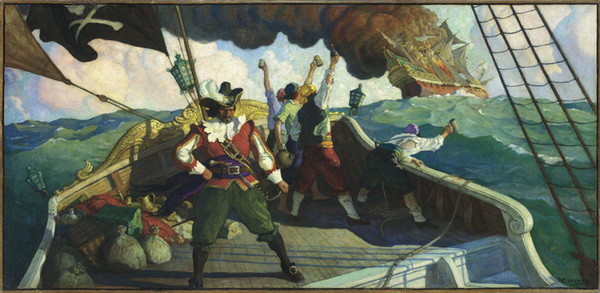 When the founder of Qoro Fine Art Services in New Castle, Delaware named his new business, he combined the letter “Q” for quality with the Spanish word for gold. But according to one satisfied client, the name Qoro could also be an acronym for “Quality of Reproduction-Outstanding!” And while Qoro does have the equipment and skill to make great reproductions of original oil paintings and other art, the firm offers much more than gold-quality printmaking.
When the founder of Qoro Fine Art Services in New Castle, Delaware named his new business, he combined the letter “Q” for quality with the Spanish word for gold. But according to one satisfied client, the name Qoro could also be an acronym for “Quality of Reproduction-Outstanding!” And while Qoro does have the equipment and skill to make great reproductions of original oil paintings and other art, the firm offers much more than gold-quality printmaking.
Having been in the business for more than 10 years, they have interacted with galleries, museum curators, art publishers, and art schools and gained insights that can help artists with every facet of their careers. They freely share some of these insights online and through consultations with each artist they work with.
Advised Pigment Ink Developers: One distinctive chapter of Qoro’s history is that staff members provided insights to some of the chemists and researchers who were developing some of the pigment ink technology that has enabled inkjet printing to gain widespread acceptance in fine-art publishing.
Qoro’s founder Bill Jensen was a frame-shop owner, whose friends included chemists who were working with inkjet printer manufacturers on pigment inksets that would provide both the wide color gamuts and long print life that art publishers, galleries, and collectors would expect.
So Jensen started Qoro as a printing business in the late 1990s and began exploring how inkjet printing could be used to reproduce paintings and fulfill orders for art sold online.
Although Jensen has since retired, Davis and Griffith have both been with Qoro since 2000. They recall talking at length with ink chemists and color scientists about how inkjet-printing technology could be improved to meet the expectations of potential producers and buyers of art prints. During these consulting sessions, Davis and Griffith gained extensive firsthand knowledge about some of the chemistry and color science behind print permanence and image quality.
Today, Griffith and Davis are so confident in the quality of the inks, substrates, and protective coatings that they use in printmaking, that they offer Qoro customers a full replacement guarantee. Because they know that most artists don’t really want to delve into the complexities of ink and coating chemistry and print-permanence testing, Griffith and Davis decided to make Qoro’s guarantee as simple and as straightforward as possible.
As stated on their website: “If you damage a Qoro Replica™ we will replace it at no charge. Simply return the damaged product to Qoro and we will send you a new one.” The word “damage” in their replacement guarantee doesn’t just apply to fading or water damage. It includes damage of any kind.
According to Griffith, the purpose of this guarantee is to make buyers comfortable enough to hang their art anywhere they want with the confidence that it will always remain as beautiful as it was the day they purchased it. Because most artists and art buyers traditionally handle artwork with great care, Qoro has only had to replace a few prints. For example, they replaced one Qoro Replica that had been displayed outdoors for five years on the deck of yacht, where it was routinely exposed to bright sunlight and salty, humid air. And, they have replaced a few prints that were damaged during stretching or accidentally gashed by an artist preparing for a show.

Personalized Marketing Advice: Davis and Griffith have worked with enough artists to understand that no two artists are alike, and each has different goals, aspirations, and levels of knowledge and experience. Qoro gladly provides personalized, high-quality of printmaking services to all artists—whether they are just starting out after graduation, pursuing an art career after retiring from another job, or are already selling originals for thousands of dollars each.
“I care about every piece of art that comes through our doors,” says Davis, who is an artist himself.
Qoro has made prints for hundreds of artists, including masters such as N.C. Wyeth. They also help institutions such as the Delaware Art Museum and Delaware Historical Society supplement their revenues by offering reproductions of selected works of painters such as Edward Hopper and illustrator Howard Pyle. Qoro has also reproduced paintings so that each heir of an estate can have a high-quality replica of a treasured family heirloom art.
High-Quality Equipment and Materials: For image capture, Davis uses a PhaseOne large-format camera. It has enough resolution to give printed reproductions the illusion of a three-dimensional surface. For printing, he currently uses a Canon imagePROGRAF iPF 8100 printer with Onyx software.
Many of the canvases and art papers Qoro uses come from LexJet. “LexJet has been a godsend for us,” says Davis. “As a company they have the same idea that we have—that the customer comes first. When I call my salesperson Dustin Flowers, he treats me as if I’m the biggest account out there.
Along with the Sunset Select Matte Canvas, Davis uses either Sunset Gloss or Matte coatings, depending on which look a client prefers.
What to Look for When Hiring a Printmaker: Thanks to the advances in pigment-ink technology that Davis and Griffith saw being developed, almost anyone can afford to buy a wide-format inkjet printer and promote themselves as being capable of being in the “fine-art reproduction business.”
Davis says artists should spend more time investigating how the services and capabilities of one printmaker differ from others. According to Davis, artists should pay attention to these three things:
- the quality of the equipment used in the image capture;
- what services are included in the price and which services cost extra; and
- any clauses in the contract that may grant the printmaker permission to use your art in ways you didn’t intend.
Davis advises artists to “Learn as much as you can before you commit and always protect your work by reading the fine print in a contract.”
To learn more about Qoro, you can follow them on Twitter, become a fan on Facebook, or read Frank Davis’ blog (“Frank Discussions”). You can also visit their online gallery, through which they sell prints and originals from clients, artists and museums directly to interested customers. (www.qoro.com and www.qoroart.com)

